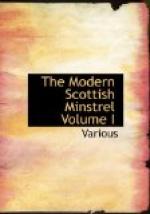Thy skinny, thy cold, thy visageless mould,
Its disgust is untold, and its surface is dim;
What a signal of wrack is the wrinkle’s dull track,
And the bend of the back, and the limp of the limb!
Thou leper of fear—thou niggard of cheer—
Where glory is dear, shall thy welcome be found?
Thou contempt of the brave—oh, rather the grave,
Than to pine as the slave that thy fetters have bound.
Like the dusk of the day is thy colour of gray,
Thou foe of the lay, and thou phantom of gloom;
Thou bane of delight—when thy shivering plight,
And thy grizzle of white,[129] and thy crippleness, come
To beg at the door; ah, woe for the poor,
And the greeting unsure that grudges their bread;
All unwelcome they call—from the hut to the hall
The confession of all is, “’Tis time he were dead!”
The picturesque portion of the description here terminates. With respect to the moral and religious application, it is but just to the poet to say, that before the close he appeals in pathetic terms to the young, warning them not to boast of their strength, or to abuse it; and that he concludes his lay with the sentiment, that whatever may be the ills of “age,” there are worse that await an unrepenting death, and a suffering eternity.
[127] Alluding to the plagues.
[128] The teeth.
[129] Gaelic—Matted, rough, gray beard.
NORMAN MACLEOD;
OR, TORMAID BAN.
Single-speech Hamilton may be said to have had his marrow in a Highland bard, nearly his contemporary, whose one effort was attended with more lasting popularity than the sole oration of that celebrated person. The clan song of the Mackenzies is the composition in question, and its author is now ascertained to have been a gentleman, or farmer of the better class, of the name of Norman Macleod, a native of Assynt[130] in Sutherland. The most memorable particular known of this person, besides the production of his poetic effort, is his having been the father of a Glasgow professor,[131] whom we remember occupying the chair of Church History in the university in very advanced age, about 1814, assisted by a helper and successor; and of another son, who was the respected minister of Rogart till towards the end of last century.
The date of “Caberfae” is not exactly ascertained. It was composed during the exile of Lord Seaforth, but, we imagine, before the ’45, in which he did not take part, and while Macshimei (Lord Lovat) still passed for a Whig. In Mackenzie’s excellent collection (p. 361), a later date is assigned to the production.
The Seaforth tenantry, who (after the manner of the clans) privately supported their chief in his exile, appear to have been much aggrieved by some proceedings of the loyalist, Monro of Fowlis, who, along with his neighbour of Culloden and Lovat, were probably acting under government commission, in which the interests of the crown were seconded by personal or family antagonism. The loyal family of Sutherland, who seem by grant or lease to have had an interest in the estates, also come in for a share of the bard’s resentment.




